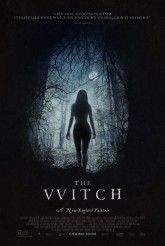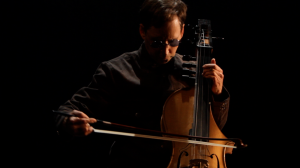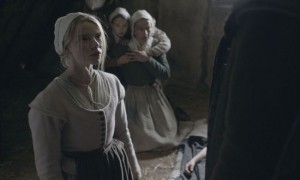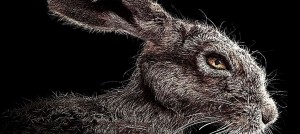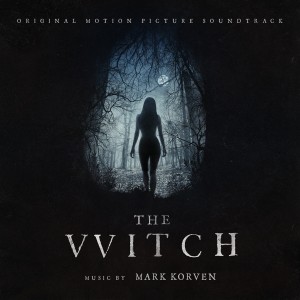There are horror films and scores that do a good job of scaring you, and then there are others like THE EXORCIST, THE SHINING and A NIGHTMARE ON ELM STREET that truly hit a nerve by making one feel that they’ve taken part in something unholy – or at least that’s if you believe The Satanic Temple’s big thumbs up that THE WITCH is a “transformative Satanic experience.” Whether one feels encouraged to strip naked in the woods and call upon the powers of darkness remains to be seen after a viewing of THE WITCH But one thing that that can be heard in Robert Egger’s critically acclaimed, authentic-as-can-be horror film is the feeling of being utterly immersed in Mark Korven’s nerve-jangling, period-specific score where all trails lead to madness.
Easily the most outré, expressionistic score to impressively grace a genre film since Mica Levi accompanied an alien seductress’ manhunt for UNDER THE SKIN, Mark Korven’s miasma of melody and dissonance digs into the nerve endings in a truly unsettling way, making one a believer in a terrifying force that lies in in the nether regions of 1630 Colonial America. Given an outcast family unlucky enough to re-settle in the middle of nowhere, Korven gradually makes a sacrifice of these hapless, religiously dogmatic characters with his way of digging into their fevered imaginations with sharp strings, howling voices, tribal percussion and uncanny, time-lost instruments. It’s music that materializes evil that may, or may not be there, a score that you most definitely do not want to play in the dark, let alone by yourself for fear that the shadows might come alive with ancient evil.
That THE WITCH is an especially striking score for what promises to be a literal cult film is perhaps the only thing that’s not strange when it comes to Korven’s resume, as this Canadian can lay claim to the true chamber score of 1997’s CUBE. Having since remained particularly busy on such documentaries like FRIDAY THE 13TH: THE DEVIL IN DOVER when not scoring such features as CRUEL: & UNUSUAL, the cop TV drama THE BORDER and his own short films DEAD MONDAY and NEXT LIFE FLOP. THE WITCH is a welcome opportunity for the Genie-winning composer to cast another, unique, malefic spell in the service of relentless doom.
ASSIGNMENT X: Could you tell us about the start of your scoring career?
MARK KORVEN: I’ve been a musician since I was 13 or so. Many years later, I started writing left-of-center pop songs and was eventually signed to a record label. I had my first film literally fall into my lap, but I loved music for picture. It felt right away that it was the direction that I should be moving in.
AX: You’ve been active in Canadian films since the well-received arthouse film I’VE HEARD THE MERMAIDS SINGING back in 1987. But for me, it was the film CUBE where I really noticed how unique your approach was. Could you talk about your experience on that cult classic, and how it might have led you to THE WITCH?
KORVEN: CUBE was a very low budget sci-fi horror coming out of the Canadian Film Centre, directed by film student Vincenzo Natale. I’d never done a horror film before that, but I had always wanted to score one, since you can almost get away with anything. You can be as experimental and strange as you like, which most composers relish. It was a real struggle sometimes working with Vincenzo because he didn’t want any kind of harmony or melody in the score. He wanted it completely soundscape-like and alien. And he would react badly to anything that sounded like a conventional instrument. So it was a real stretch for me, and I think in a good way. It kept me on my toes to always think in a fresh way. Vincenzo was young, driven and a real visionary. Most of this parallels my experience with Robert Eggers on THE WITCH.
AX: What were your discussions with Robert Eggers as to what he wanted the score to accomplish?
KORVEN: Robert played me all kinds of 17th century music, and a lot of 20th century stuff like Penderecki. He didn’t want me to emulate it really, just to have my ears in that space. He was trying to establish the right mood before I even started. He knew what he wanted, not just with the score, but also for absolutely every other aspect of the film. Robert is a hands-on director. When you see “a film by Robert Eggers”, it really is that. Rob said that what he was looking for was a “90-minute Puritan nightmare,” and he wanted the music to support that.
AX: What kind of research did you do into period instruments of the film’s 1630 setting, and how did you decide on your ensemble?
KORVEN: I did a little research, but Robert wasn’t really interested in a period ensemble. He was after the right mood. With the Swedish Nyckelharpa, which you would not have heard in New England in 1630, it just had “the sound” – very archaic, almost primitive and in a way kind of creepy, especially when it’s played by myself, because I’m not that great of a player. That was good, because Robert liked the human imperfections, and I did too. Perfect is boring.
AX: Did you do any research into the witchcraft craze of the time as well?
KORVEN: No. If I wanted to learn anything about witchcraft or the era in which the story was set, I’d just ask Robert. He’s a human encyclopedia. When he prepares for a film, he makes it his mission to read almost every book written on the subject and visit every museum. For “The Witch,” he had an entire bookcase of books about witches.
KORVEN: I’m glad that you mentioned Polanski, because I look at THE WITCH kind of like Polanski Horror, like REPULSION, THE TENANT or ROSEMARY’S BABY, which are mood pieces. No cheap jump scares. In a way, I think THE WITCH harkens back to those times when horror was genuinely creepy on a deep level. As far as boning up on other scores, I deliberately chose to not do that. We were trying to create something unique so I didn’t want to be overly influenced by other things.
AX: For a good bit of the film, there’s a possibility that the horrors are taking place in these isolated character’s minds. Did you want the music to contribute to that seed of doubt the audience might have as if there’s a real witch about?
KORVEN: Yes, definitely. Since we don’t see much of the witch, it almost becomes the witch character. It’s always there, just off screen, the dark presence. So the music maintains that threat. It keeps us in the nightmare. It wasn’t something that I consciously thought about while composing. It struck me when I saw a screening of the film much later. “Hey, the music score is the witch!”
AX: Given that THE WITCH takes great pains from its design to its costuming and script to make its setting as real as possible, did you want that eerie sense of realism to inflect your score as well?
KORVEN: Well again, this was Robert. He wanted everything to be acoustic and real. He wanted humans playing at all times. It was a discipline, and Rob is very disciplined. He has a ton of integrity and the film is his pure vision. And the score has integrity too, because really, Robert was driving that bus.
AX: For the most part, your score inhabits the background in a way that’s unusually subtle for impressionistic horror scoring. Was it important not to go for those loud, “Boo!” moments?
AX: Do you think the woods are something that’s naturally scary? And have you ever gotten lost in them yourself?
KORVEN: Once. And it was scary, because there were bear droppings everywhere. But the next morning we came upon a hiker. Turns out that all that time we were lost, we were about 500 feet from a MacDonald’s parking lot.
AX: What do you think musically makes up a witch?
KORVEN: Basically every element in the score, since the score was the witch. The nyckelharpa, the water phone, the Finnish Jouhikko. Harmonically it was dissonance of course, but then the entire score is pretty dissonant.
AX: Another spirit that’s very much apparent in the witch is that of Gyorgi Ligeti, especially in its terrifying use of voices and high strings that filled such creepy Kubrick soundtracks as 2001 and THE SHINING. Do you think that kind of modernistic, impressionistic approach adds to the horror, where something more conventionally melodic style might not have here?
KORVEN: Robert was very set on the idea of constant dissonance. No melody, no traditional harmony. So if I hit a major chord at any point, or even dabbled in some conventional harmony, the audience would think butterflies and rainbows, which is not good! The challenge was how do you build it? How do you go anywhere when your dissonance meter was already set to “ten”? That was a real struggle for me as composer.
AX: Like Robert, you’ve directed a lot of short films as well. How do you think your other talents behind the camera abet your work as a composer?
KORVEN: Directing short films has had a huge benefit for me as a composer. It’s enabled me to get a glimpse of what directors go through to make a film. I used to think of myself as a composer operating outside of the film, tacked on to the end of the process. Now, when someone brings me a film to score, I just want to give them a big hug and say, “Fantastic! You did it!!” I can empathize with filmmakers much more now. I have checked my ego at the door, as they say.
I realize now that the film is absolutely not about me. It is about doing whatever I can to help the director realize their vision. Yes, I have an opinion that I will express, but I don’t take it personally if it’s rejected. It’s not about me. It’s about the film and where the director wants to take it. There’s a quote I heard – I can’t remember where – of some famous director saying to his composer, “I don’t want you expressing yourself all over my film!”
AX: What was it like composing, and having singers realize the chant for a “Witch’s Coven?” And what are the words saying?
KORVEN: The words were actually taken from a black magic chant. I can’t remember the literal meaning. Just a lot of dark satanic stuff. But Robert thought it best that he change a few of the words here and there so that some of us weren’t transformed into newts or something. You know, sort of to water down the spell. I mean, one never knows. So anyway, I just took the chant and made it work in more of a “musical” (and I use the term loosely) context.
AX: Conversely, the end titles use the lovely “Isle of Wight.” How did you discover this song?
KORVEN: That was brought in by Katherine Hill, who played Swedish Nyckelharpa and sang “Isle of Wight”. Rob again, was very specific. He wanted a song from that era that was Protestant, not Catholic. And Katherine is so good at that late renaissance / early baroque style. Like Robert, she’s kind of a walking encyclopedia.
AX: Was there a point where what you were composing was scaring yourself?
KORVEN: Well, the witch’s coven got a little weird. I think we freaked out the recording engineer a little with that one. The choir was asked to go to a very strange and dark place. But I’m pretty used to dissonance so it’s pretty ingrained in me. When I was scoring the documentary “Shake hands with the Devil” about the Rwandan Genocide that was scaring me. That was real life. This is a movie.
AX: Why do you think, THE WTCH has broken out as a horror film, and what do you think the music’s part is in its effectiveness?
KORVEN: Robert is a fresh face in horror. No one is doing what he’s doing. He’s like Ingmar Bergman making a horror film. I think people are getting pretty tired of typical jump scare gore fest horror. Robert is about mood and authenticity. He creates a world that we’ve never seen before, and makes us believe it. And beyond that, I think Robert will prove to be very influential in the field.
AX: What do you think of the film’s publicity as trumpeting THE WITCH as being the closest thing to a satanic experience that a movie has gotten?
KORVEN: I’m cautious about hype of all kinds. It’s a movie, not a satanic experience. At least I hope to hell it isn’t! Or I’m in big, big trouble!
AX: Do you hope that THE WITCH takes you further down the darker recesses of horror films?
KORVEN: Well, what I really hope for is not necessarily “darker recesses” but good films, like THE WITCH certainly is. I just want to be involved with quality projects. I mean that’s what most of us really want, that your name becomes synonymous with high quality and creative integrity.
Listen to THE WITCH if you dare on Milan Records digitally HERE, before it appears on CD March 4th and LP May 20th.
Visit Mark Korven’s website HERE
Follow us on Twitter at ASSIGNMENT X
Fan us on Facebook at ASSIGNMENT X
Article Source: Assignment X
Article: THE WITCH: Mark Korven is in a musical thrall – Exclusive Interview
Related Posts:




